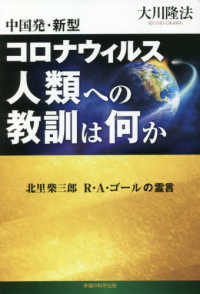- ホーム
- > 洋書
- > 英文書
- > Business / Economics
Full Description
In the critically acclaimed La Fin de la Pauverté?, Romain D. Huret identifies a network of experts who were dedicated to the post-World War II battle against poverty in the United States. John Angell's translation of Huret's work brings to light for an English-speaking audience this critical set of intellectuals working in federal government, academic institutions, and think tanks. Their efforts to create a policy bureaucracy to support federal socio-economic action spanned from the last days of the New Deal to the late 1960s when President Richard M. Nixon implemented the Family Assistance Plan. Often toiling in obscurity, this cadre of experts waged their own war not only on poverty but on the American political establishment. Their policy recommendations, as Huret clearly shows, often militated against the unscientific prejudices and electoral calculations that ruled Washington D.C. politics.
The Experts' War on Poverty highlights the metrics, research, and economic and social facts these social scientists employed in their work, and thereby reveals the unstable institutional foundation of successive executive efforts to grapple with gross social and economic disparities in the United States. Huret argues that this internal war, coming at a time of great disruption due to the Cold War, undermined and fractured the institutional system officially directed at ending poverty. The official War on Poverty, which arguably reached its peak under President Lyndon B. Johnson, was thus fomented and maintained by a group of experts determined to fight poverty in radical ways that outstripped both the operational capacity of the federal government and the political will of a succession of presidents.
Contents
Introduction
Part One: A Science of Poverty (1945-1963)
1. The Poverty Paradox
2. The Poverty Culture
3. The New Wisconsin Idea
4. Beyond the Affluent Society
Part Two: From Science to War (1963-1974)
5. An Economist at War
6. A Pyrrhic Victory
7. Uncertainty of Numbers, Certainty of Decisions
8. A Doomed Alternative
Conclusion
Acknowledgments
Notes
Bibliography
Index








